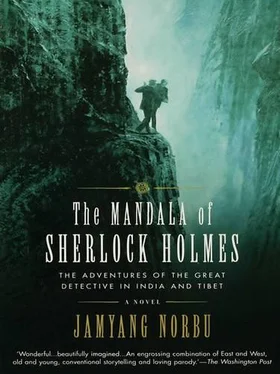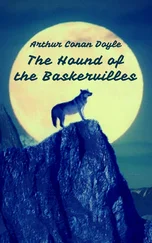'The honour would be mine, Strickland. There are no patents on my methods. I only ask you to keep my name out of it, especially if the results of your endeavour should be fruitful enough to warrant the attention of the press. At present it suits my purpose to let the world think I am dead. I am sorry I do not have a copy of my monograph here with me, but you can get it from Huber in London, if you wish. They also have some other small works of mine that may interest you. The one entitled Upon the Distinction Between the Ashes of Various Tobaccos may prove useful to you. If you can recognise the black ash of a Trichinopoly at the scene of a murder, why, you could then count Colonel Sebastian Moran as one of your suspects – for I know he smokes them.'
'Well, Mr Holmes,' said Strickland with a little laugh, 'Trichinopoly or Lunkah, you can rely on us to have the Colonel behind bars before long. Once that desk-clerk has had time to reflect in the solitude of his cell, he will consider a full confession and transportation to the Andaman Islands preferable to stretching on the gallows.'
Just then there was an urgent knock on the door. Strickland went over and opened it. Outside in the corridor was a nervous-looking native policeman.
'Havildar, kya hai?' demanded Strickland.
The policeman mumbled something inaudible. Strickland turned a very worried face to us.
'The clerk's just been shot in front of the police station.'
Without a word Sherlock Holmes rushed out of the room. Strickland and I followed him out of the hotel to the rank of carriages that stood outside the hotel gates. As our carriage rattled down Frere Street towards Horniman Circle, Mr Holmes lit a cigarette and puffed at it in an abrupt and vexed manner.
'It was criminally careless of me not to have anticipated Moran's move,' said he. 'Now I fear that the one frail thread we had to tie up this case has just snapped.'
'But we still have the evidence of the thumbprint, Mr Holmes,' I suggested. 'Would it not suffice, in the ad interim, to secure the detention of Colonel Moran, till a more formidable case has been formulated?'
'My dear Huree, the evidence of the thumbprint would be too outre for any magistrate to think of issuing a warrant against a person of Moran's standing. We must not also forget that our old shikari is a man of diverse resources; he would flick away any such obstacles as we could, at the moment, put in his way.'
'I fear you are right, Mr Holmes,' said Strickland dejectedly. 'We needed that blasted desk-clerk's confession, and now he's dead. I should have warned MacLeod…'
'The fault is entirely mine, Strickland,' said Sherlock Holmes gravely. 'You could not have foreseen such an eventuality. But hulloa! I see we have arrived at our destination. Nothing less than a murder would draw such a mob – if the morbid curiosity of the London crowd is anything to judge the rest of humanity by.'
Indeed, the crowd before the Horniman Circle police station was so large that the progress of our carriage was severely impeded. In spite of my remonstrances, barefooted little street urchins clambered like monkeys all over our carriage to secure a loftier view point. Finally Strickland and the police sergeant had to dismount and force their way through the press of bodies. After paying off the ghariwallah, Mr Holmes and I followed.
'Chale jao, you chaps,' Strickland shouted above the hubbub, 'move along there.' Swinging his swagger-stick vigorously before him, he managed to clear a path through the throng. Some constables spotted us and, brandishing their lathis, came to our assistance. Once we got through the crowd I saw a large pool of blood on the ground. The body had been removed to the police station. Inside, a visibly distraught Inspector MacLeod met us, his grey scraggly moustache looking more dishevelled than ever.
'I'm very sorry about this, Sir,' he stammered. 'For the life of me I just can't imagine…'
'My dear MacLeod,' Strickland interrupted,'just tell us exactly what happened…'
'Well Sir,' the inspector began, 'I escorted the prisoner from the hotel in the police victoria. I had two constables with me. When the victoria got to the thana and I was alighting, something struck the prisoner on the chest, mutilating it horribly. The effect was that of a gun-shot wound, but it could nae have been one. since neither I nor the constables heard the sound of a fire-arm being discharged. We managed to get the wounded man inside and Dr Patterson immediately attended to him, but it was nae use. He died a few minutes later.'
A stout middle-aged Englishman in a white surgical gown came out from another room. I presumed this was Dr Patterson.
'Good evening, Mr Strickland… gentlemen,' he greeted us quickly and turned to Inspector MacLeod. 'Your man was definitely shot, MacLeod, and here's the bullet that did it. I just got it out of his chest.'
He held out a white enamel dish in which a single bloodstained bullet rolled to and fro. Sherlock Holmes bent over to examine it.
'A soft revolver bullet,' he declared. 'As you will perceive, it expanded considerably after discharge, thus inflicting the horrible mutilation on the body that Inspector MacLeod described.'
'But it could nae have been a revolver,' cried the bewildered inspector, tugging his scraggly whiskers in irritation. 'As I said before there was no sound of a gun being fired. And at this time of the night there is nae so much ado in the streets, that a pistol shot could nae have been heard.'
'See for yourself then,' Sherlock Holmes replied, pointing to the small bullet in the dish.
'I am nae denying it is a bullet, Sir,' protested the nettled inspector, 'but Captain Strickland, Sir, you know that the whole courtyard in front of the station is well lit with gas lamps. I am willing to stake my pension that there was nobody around the prisoner and me, at least within pistol range.'
'But further away,' suggested Strickland, 'on the other side of the street maybe.'
'That's a good eighty feet or more away,' replied the inspector, 'and I can nae be sure.'
'Was there any traffic on the street then, any carriage passed you by at that moment?'
'Nae, I am sure of it. Well there was this van – one of those covered delivery things – parked in front of one of the shops on the other side of the street. But nae even a crack shot could have hit a man at that range with just a pistol – especially at night.'
'Wouldn't it be rather late to make deliveries?' remarked Holmes, walking to the open window and peering out into the night. 'It is not there now, at any rate.' He turned away from the window to face us. 'Dear me. Dear me. What a singular problem.'
Something in his tone caught my ear. It seemed to me that the tone of his voice, far from sounding puzzled, hinted at privileged information. Strickland may have detected it too, for he immediately attempted to end the discussion and get Sherlock Holmes out of the police station.
'Well, there's nothing more we can do tonight,' said Strickland briskly, moving to the door. 'MacLeod, firstthing tomorrow I want you to question all the shopkeepers and residents around here for any unusual activity or suspicious persons they may have seen at the time of the shooting.'
The crowd outside the police station had by now dispersed. The glow of the gas lamps fell on the prone figures of a few beggars sleeping on the hard pavement. The twanging of a sitar drifted faintly through the still night air. For a moment I thought of the plump Portuguese clerk now lying lifeless on a concrete slab in the police mortuary, while his soul was beginning its journey to 'that undiscovered countryfrom whose bourn no traveller returns.' A constable flagged down a carriage for us and we rode back to the hotel, savouring the coolness of the late night air.
Читать дальше












